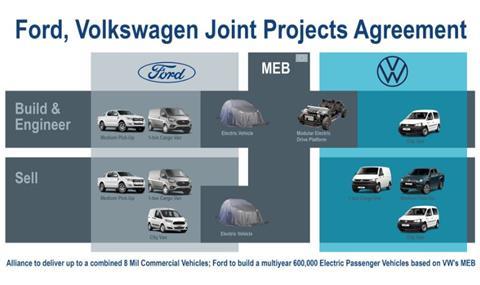
Ford Motor Company and Volkswagen have revealed more details of their joint alliance to develop commercial and electric vans.
The agreement aims to support faster advancement of vehicle innovation, incorporating relevant new technologies, delivering better utility and offering more model choices.
A city delivery van is planned to be available in 2021, based on the latest Volkswagen Caddy model and developed and built by Volkswagen Commercial Vehicles.
A highly differentiated Ford electric vehicle for Europe will follow by 2023, built on Volkswagen’s Modular Electric Drive (MEB) toolkit, expanding on Ford’s zero-emission capabilities in the region.
During the lifecycles of the products, the companies expect to produce up to a combined eight million of a medium pickup truck and both vans included in the commercial relationships.
Additionally, the companies will both work with US software company Argo AI to form distinct autonomous vehicle businesses based on Argo AI’s self-driving technology.
“In light of the Covid-19 pandemic and its impacts on the global economy, more than ever it is vital to set up resilient alliances between strong companies,” explained Volkswagen group chief executive Herbert Diess. “This collaboration will efficiently drive down development costs, allowing broader global distribution of electric and commercial vehicles, and enhance the positions of both companies."
Added Ford chief executive Jim Hackett: “This alliance comes at a time of tremendous enthusiasm about the intersection of increasingly intelligent, connected vehicles in an ever-smarter world. This creates a huge opportunity to innovate and solve many of the world’s transportation challenges and deliver extraordinary benefits to customers – even as companies need to be selective about how they use their cash.”
Ford and Volkswagen both have strong commercial van and pickup businesses, including models such as Ford’s Transit and Ford Ranger and Volkswagen’s Transporter, Crafter, Caddy and Volkswagen Amarok.
Jim Farley, Ford chief operating officer, said: “Commercial vehicles are fundamental to Ford today and an area where we will accelerate and grow, and working with Volkswagen on these platforms will provide both of us significant financial advantages in things like engineering, and plants and tooling.
“Separately, Ford will add battery electric versions of E-Transit and F-150 in the next 24 months for commercial customers who increasingly need zero emissions and the power of connectivity, data and artificial intelligence."
Thomas Sedran, chairman of the board of management board for Volkswagen Commercial Vehicles, said: “The collaboration with Ford is a key building block of our GRIP 2025+ strategy and part of the current transformation of Volkswagen Commercial Vehicles. This long-term cooperation with Ford will strengthen our very good position in area of light commercial vehicles, especially in our core European markets, and is proof that we are successfully implementing our plan step by step.”
Ford predicts that from 2023 it can deliver 600,000 electric vehicles using the MEB architecture, which is designed to combine space and performance with electric drive. The vehicle, which will be designed and engineered by Ford in Cologne-Merkenich, will add to its own all-electric Mustang Mach-E, which will be introduced in 2021.













